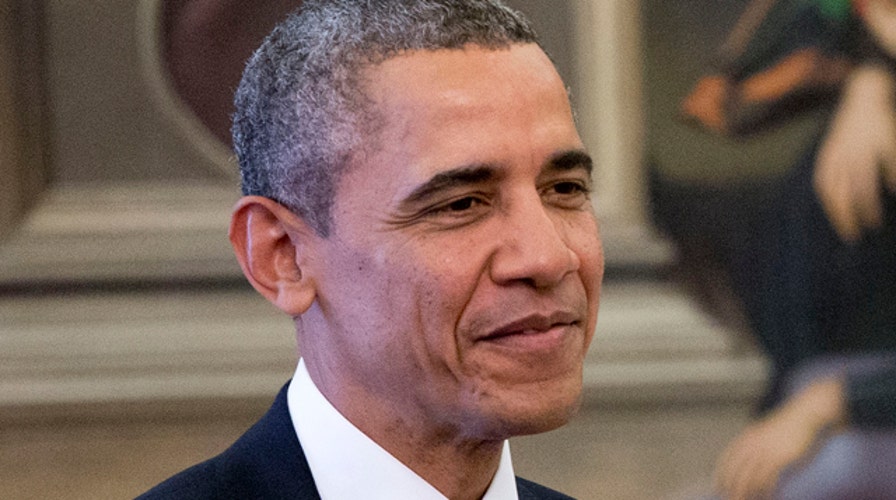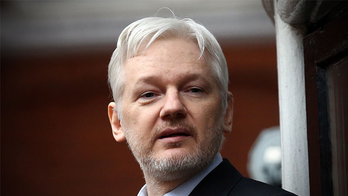By a widening margin, more voters think the United States is weaker since Barack Obama became president. And the highest number in a decade feels the country is less safe than it was before 9/11, according to a Fox News poll released Wednesday.
The poll also finds most voters think President Obama has not been tough enough on Russia, although a majority still says the U.S. should stay out of the situation in Ukraine.
Click here for the poll results.
Some 52 percent of voters think the country is weaker and less powerful today than it was six years ago. That’s three times the 17 percent who say the country is stronger and more powerful. About 3 in 10 think it is unchanged (29 percent).
Last year, 48 percent said weaker, 24 percent stronger and 27 percent unchanged (Feb. 2013).
The number of Democrats saying the country is stronger now has dropped 11 percentage points: it’s 32 percent today, down from 43 percent in 2013. Twenty-two percent of Democrats say the country is weaker and 44 percent say it is the same.
Views among Republicans are lopsided: 78 percent say the country is weaker under Obama vs. five percent stronger.
The poll also shows a significant deterioration in Americans’ sense of security over the past decade. In 2004, by a 35-point margin, more voters said the U.S. was safer than before 9/11. In 2010, nearly two years into Obama’s first term, the margin had narrowed to 23 points. Now the spread is down to 10 points: 49 percent think the country is safer today, while a record-high 39 percent say it is less safe.
Furthermore, the number that believes the U.S. is the world’s “most dominant power” has dropped 26 points since 2002: 85 percent felt that way then, while 59 percent say the same today.
Thirty-four percent think another country is more powerful than the U.S., and the countries these voters cite most frequently are China (60 percent) and Russia (21 percent).
In general, 69 percent of voters are following news about Russia and Ukraine at least somewhat closely, and 76 percent are concerned about what’s happening there.
More voters disapprove (46 percent) than approve (38 percent) of how the Obama administration is handling the situation in Ukraine.
Moreover, 66 percent think Obama hasn’t been tough enough on Russia. That includes a 60-percent majority of Democrats.
So far the U.S. has responded to Russia’s annexation of Crimea with economic sanctions. Voters are divided on this action: while 41 percent think it’s “too weak,” almost as many -- 40 percent -- say it’s “about right.” Just seven percent see it as “too strong.”
While 35 percent of voters say the U.S. should be more involved in Ukraine, a 53-percent majority says the U.S. shouldn’t.
At the same time, many more think military force will be required to stop Russia from taking control of Crimea (50 percent), than think diplomacy and sanctions alone will work (30 percent).
Overall, 40 percent of voters approve of the job President Obama is doing, while 53 percent disapprove. That’s an improvement from earlier this month when he hit a record low of 38 percent approval (54 percent disapproved).
Still, a record-low 43 percent of voters say Obama is a “strong and decisive leader,” while 55 percent disagree. During his first year in office, voters said he was a strong leader by a 60-37 percent margin.
By a five-point margin, more voters think Obama is a “strong negotiator with foreign leaders” than think the same of Russian President Vladimir Putin: 40 percent say Obama is, while 35 percent say Putin is. And there’s been an uptick in approval for how Obama’s handling foreign policy: 37 percent approve, up from a low of 33 percent three weeks ago (March 2-4).
What about the chess test? By a wide 49-31 percent margin, voters think Russian President Vladimir Putin would beat Obama in a game of chess. That includes majorities of Republicans (66 percent) and independents (53 percent) and nearly a third of Democrats (30 percent).
Poll Pourri
Recently the Obama administration announced plans for the U.S. government to give up its oversight of the Internet to an international organization. Most voters disagree with that decision: 66 percent think it’s a bad thing for the U.S. to give up control of the Internet, including majorities of Republicans (77 percent), independents (68 percent) and Democrats (54 percent).
Overall, 20 percent say it’s a good thing for the U.S. to cede control of the Internet.
By a similar margin, most voters disapprove of the U.S. ending the space shuttle program (63 percent disapprove, while 25 percent approve).
The Fox News poll is based on landline and cell phone interviews with 1,015 randomly chosen registered voters nationwide and was conducted under the joint direction of Anderson Robbins Research (D) and Shaw & Company Research (R) from March 23 to March 25, 2014. It has a margin of sampling error of plus or minus three percentage points for the total sample.





